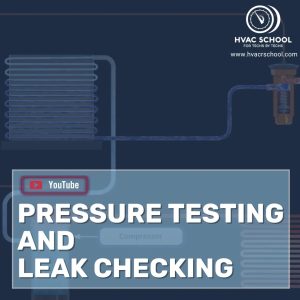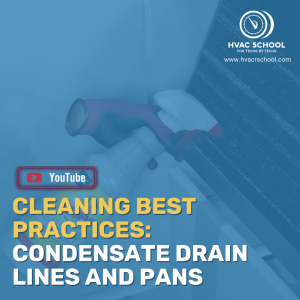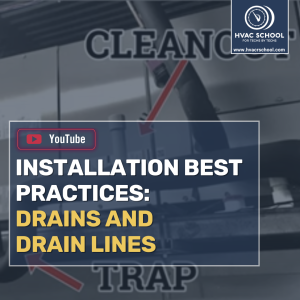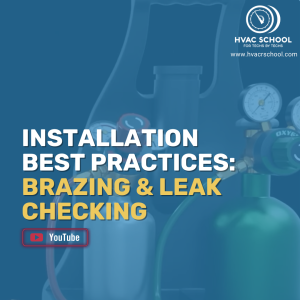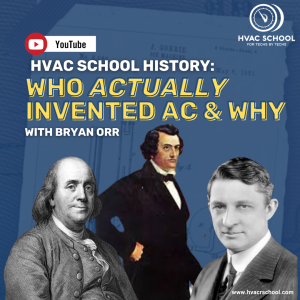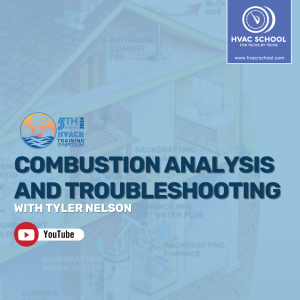BACK
 HVAC Moneyball: Could It Work?
HVAC Moneyball: Could It Work?
 One Way to Picture Superheat and Subcool
One Way to Picture Superheat and Subcool
 Six Tips to Help You Write an Article for HVAC School
Six Tips to Help You Write an Article for HVAC School
 Where Should the Float Switch Go?
Where Should the Float Switch Go?
 Soft Lockout vs. Hard Lockout
Soft Lockout vs. Hard Lockout
 To Glass Ceilings And Those Who Lend Us Their Hammers
To Glass Ceilings And Those Who Lend Us Their Hammers
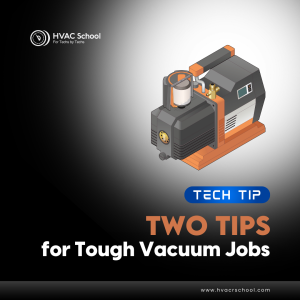 Two Tips for Tough Vacuum Jobs
Two Tips for Tough Vacuum Jobs
 Is Value Perceived?
Is Value Perceived?
 What to Do with Your Micro-Manometer
What to Do with Your Micro-Manometer
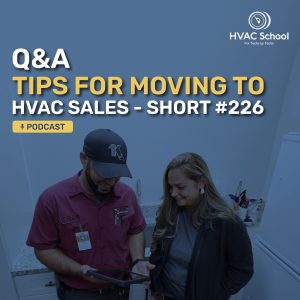 Q&A – Tips for Moving to HVAC Sales – Short #226
Q&A – Tips for Moving to HVAC Sales – Short #226
 White Shirt Techs – Manifesto
White Shirt Techs – Manifesto
 Q&A – Double Flares – Short #225
Q&A – Double Flares – Short #225
 Can You Coat Fiberglass?
Can You Coat Fiberglass?
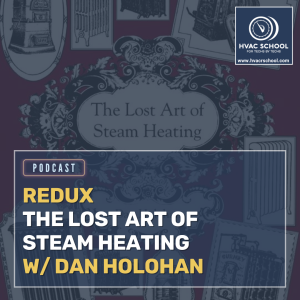 Redux – The Lost Art of Steam Heating w/ Dan Holohan
Redux – The Lost Art of Steam Heating w/ Dan Holohan
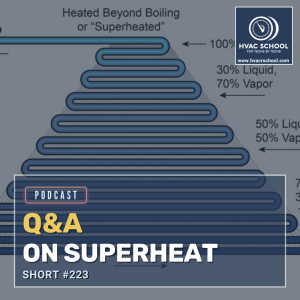 Q&A on Superheat – Short #223
Q&A on Superheat – Short #223
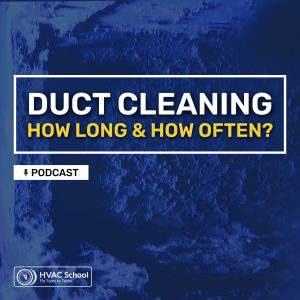 Duct Cleaning – How Long & How Often?
Duct Cleaning – How Long & How Often?
 Are EVs an Opportunity? – Short #222
Are EVs an Opportunity? – Short #222
 Choosing HVAC Cleaners w/ Becca from Viper
Choosing HVAC Cleaners w/ Becca from Viper
#hvac
Tech Tips:

This tech tip was submitted by Tim De Stasio. He originally published it on his website, which you can visit HERE. Thanks, Tim! Winning takes strategy and the right information. The HVAC business is no different. But what information should we collect, even pay for, to get better and win? What if these widely accepted […]
Read more

It took me years to build a picture in my head of what superheat and subcool mean. They were these strange words that dropped out of nowhere when I entered the HVAC world, and in the midst of grappling with so many other things, I could tell they were very important. Over time, I have, […]
Read more

This tech tip was written by David Richardson, the Vice President of Training for NCI. David has been on several podcasts and has spoken at the HVACR Training Symposium multiple times. Thanks, David! Your ideas and experiences are the ingredients for great articles. Unfortunately, they are easy to forget if you don’t capture them in […]
Read more

If you have worked at more than one company in your HVAC career, chances are you’ve found there is more than one place to put a float switch. Every company seems to have its own “secret sauce” for running drain lines and placing float switches. Is your company a “no float switch” company? Although a […]
Read more

If a furnace runs for years and years while tripping the limit switch but satisfies the thermostat, will it ever be noticed? The answer is most likely “no,” but it will depend on whether the furnace utilizes soft or hard lockouts when the limit switch trips. So, what is a soft lockout vs. a hard […]
Read more

This tech tip was written by Jennifer Manzo, an HVAC technician and the founder of the HVA-Chicks coalition, which offers tech support and training as well as resources for women in the industry. She was one of our panelists on this year's Women's Panel at the symposium and was recently featured on a livestream and […]
Read more

In the last year or so, I have had a couple of puzzling experiences related to pulling a vacuum. These instances have left me with questions and clues where I thought I had given up on understanding a certain vacuum situation. Typically, if I’ve had a hard time achieving a proper vacuum, I would be […]
Read more

The other morning, I was scrolling through HVAC Facebook groups when I came across a post from a homeowner. He was requesting recommendations for a book that would teach him how to design and install a new HVAC system, complete with ductwork, in his home. Immediately, my HVAC career flashed before my eyes like a Christian reliving […]
Read more

Imagine this: you are pulling into your driveway from a long day at work, and you see a package waiting for you on your porch. You jump out of your truck and trip over the rose bush while running to see if this is what you have been waiting for. Upon closer inspection, you realize that the […]
Read more
Videos:
Podcasts:

In this short Q&A podcast episode, Bryan answers a listener-submitted question and gives some of his tips for moving to HVAC sales from field technician/installer roles. The world of sales has a different pay structure, which makes it an appealing option to many technicians. Salespeople need to be able to have money conversations with […]
Read more

This unique podcast episode is a commentary on the phenomenon of “white shirt techs” in the HVAC industry – a term that refers to technicians who focus heavily on sales and maintaining a pristine appearance rather than technical expertise. While there's nothing inherently wrong with having good sales skills or maintaining a professional appearance, […]
Read more

In this short podcast episode, Bryan answers a listener-submitted question about double flares and their application in the HVAC/R industry. Flare connections are common in certain types of equipment, and they connect the copper to the appliance. As a result, when we make a flare, our goal is to make it leak-free. A regular […]
Read more

In this episode of the HVAC School Podcast, Bryan interviews Zach about duct coatings and their applications in HVAC systems, particularly focusing on the Hardcast RE500 product. The discussion delves into the importance of proper duct coating applications and their benefits for both contractors and customers. Zach, who has extensive experience in duct cleaning […]
Read more

In today's podcast, Bryan talks with legendary Hydronics author and trainer Dan Holohan about the history of steam heating and some practical applications of old ideas. Recently, Dan has been working on more novels, having published two of them over the past few months. Steam heating is a “lost art” nowadays; it has become […]
Read more

In this short Q&A podcast episode, Bryan answers a listener-submitted question about superheat, including what it is and how we measure it. Superheat is the number of degrees a refrigerant is above its saturation point. The saturation point is where you will have a liquid-vapor mix, so superheat only exists when a substance is […]
Read more

In this episode of the HVAC School podcast, Bryan interviews Zach from Southeast Clean Air Solutions about the intricacies of professional duct cleaning. Zach specializes in addressing duct cleaning challenges specific to the Southeastern climate, with a particular focus on fiberglass-lined ducts. The conversation delves into the complexities of cleaning different types of duct […]
Read more

In this short podcast, Bryan talks about electric vehicles and whether EVs present an opportunity for HVAC technicians. The residential sales lead at Kalos recently mentioned that keeping an EV in a conditioned garage is advantageous, and it's an upgrade we can offer our customers. In hot weather, EV battery performance and health can […]
Read more

The podcast delves into the world of HVAC chemical solutions through an in-depth conversation with Becca Stamey, the marketing director at Refrigeration Technologies. The discussion provides insights into the company's unique approach to developing cleaning products, rooted in a commitment to safety, effectiveness, and customer feedback. Founded by John Pastorello, a chemist turned HVAC […]
Read more

